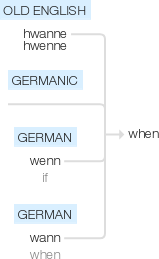When
Old English hwanne, hwenne ; of Germanic origin; related to German wenn ‘if’, wann ‘when’.
wiktionary
From Middle English when(ne), whanne, from Old English hwenne, hwænne, hwonne(“when”), from Proto-West Germanic *hwannē, from Proto-West Germanic *hwan, from Proto-Germanic *hwan(“at what time, when”), from Proto-Indo-European *kʷis(“interrogative base”).
Cognate with Dutch wanneer(“when”) and wen(“when, if”), Low German wannehr(“when”), wann(“when”) and wenn(“if, when”), German wann(“when”) and wenn(“when, if”), Gothic 𐍈𐌰𐌽( ƕan, “when, how”), Latin quandō(“when”). More at who.
Interjection sense: a playful misunderstanding of "say when" (i.e. say something / speak up when you want me to stop) as "say [the word] when".
etymonline
when (adv.)
Old English hwænne, hwenne, hwonne, from Proto-Germanic *hwan- (source also of Old Saxon hwan, Old Frisian hwenne, Middle Dutch wan, Old High German hwanne, German wann "when," wenn "if, whenever"), from pronominal stem *hwa-, from PIE root *kwo-, stem of relative and interrogative pronouns. Equivalent to Latin quom, cum. As a conjunction in late Old English. Say when "tell me when to stop pouring you this drink" is from 1889.
